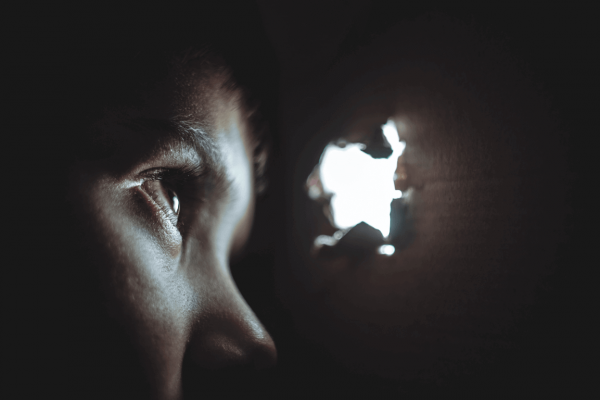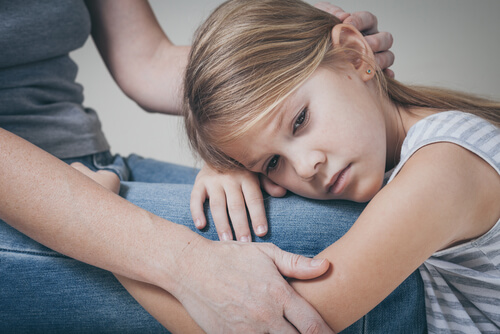Separation Anxiety: Why Attachment is Healthy For Children

Separation anxiety can happen to any child, and it has the ability to powerfully shape their daily lives. We can all think of the problems that create anxiety in adults, right? Not even just for our mental health, but also on the physical level.
And wouldn’t we all agree that a child has much less ability to regulate their emotions?
The truth is that, unfortunately, children can get stuck in habitual emotional states that make their childhood into a sad time. But the exact opposite possibility is also living inside them.
One of the truths that children have to internalize is that the people important to them aren’t abandoning them when they leave.
“It’s never too late to have a happy childhood.”
-Tom Robbins-
What is separation anxiety?
Separation anxiety comes from the fear children feel when they’re separated from their parents or the people they’re most attached to. It’s normal for this emotion to show up in small children at early ages, but it’s also normal for it to disappear pretty quickly.
And this happens because when they see their parents leave and come back they end up normalizing the separation. They don’t experience it like abandonment any more, just a temporary absence. So when does it turn into a problem?

This anxiety is harmful when it’s very intense or when the separation is not normalized. In the end, it can turn into a pathology: separation anxiety disorder.
Diagnostic criteria for separation anxiety
To be diagnosed with it, the child has to show signs of at least three of these symptoms:
- Excessive and chronic discomfort when they predict or experience a separation from their home or the people they’re most attached to.
- Constant resistance or refusal to sleep away from home, or to sleep without being near someone they’re very attached to.
- Excessive and constant worry about the possibility of losing the people they’re most attached to, or that something might happen to these people, like illness, injury, a natural disaster, or death.
- Excessive and constant worry about the possibility of something separating them from a person they’re attached to. (Like getting lost, being kidnapped, getting in an accident, or getting sick.)
- Constant resistance or refusal to go out, whether far from home, to school, work, or any other place, out of a fear of separation.
- Excessive and constant fear or resistance to being alone or without the people they’re most attached to, at home or elsewhere.
- Recurring nightmares about separation.
- Recurring complaints about physical symptoms when they experience or predict a separation. Examples are headache, stomachache, nausea, and vomiting.
On top of this, the fear and avoidance have to be constant and last four or more weeks. And that’s how the lives of our children are affected greatly.
It results in huge discomfort for the children who experience it. Actually, it’s not just the children who suffer. It’s also the adults who have to witness their child’s suffering every time they leave.
“We cannot always build a future for our youth, but we can always build our youth for the future.”
-Franklin D. Roosevelt-

What are the causes of separation anxiety?
Separation anxiety can cause social isolation, poor academic performance, and other psychological and emotional problems. But that’s not all.
They’ve also found that it can cause sleep problems, as well as create conflicts between family members. That’s why it’s important to know what factors play a role in making a child get stuck on separation.
To begin with, it’s harmful for children to constantly be with their parents. That doesn’t mean they shouldn’t spend time with their children. However, it does mean there should be times when the child and the child’s parents aren’t together. Why?
Because if there haven’t been times of brief separation, they won’t be used to it. And then they’ll probably overreact when the separation is inevitable.
To put it another way, the habitual “getting stuck” on separation we’ve talked about will only happen if the child has a lot of opportunities to get stuck on it. Usually the best thing to do is start with short absences and then extend them.
“There is always a moment in childhood when the door opens and lets the future in.”
-Graham Greene-
Also, unexpected or traumatic situations may condition the child’s anxiety or make them regress emotionally. For example, going to school, going to the hospital, or the death of a family member.
How parents can help
Lastly there are some parents who reinforce the children’s dependent behavior by bringing even more anxiety into the moment. We’re talking about children today, but there are also a lot of parents with separation anxiety who infect their children with it.

Therefore the children won’t be very independent. Likely, they’ll rely too much on parental contact and protection. Hence the importance of the people they’re attached to encourage independence little by little.
If you can do that, you’ll be doing your part to make sure your children aren’t overwhelmed by anxiety when you temporarily leave their side.
Images courtesy of Chinh Le Duc, Dmitry Ratushny and Viktor Jakovlev.
This text is provided for informational purposes only and does not replace consultation with a professional. If in doubt, consult your specialist.








